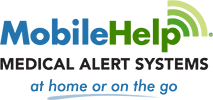Natural Intelligence does not provide medical advice, diagnosis, or treatment. If you think you may have a medical emergency, call your doctor or your local emergency number immediately.
Who Needs a Medical Alert Device?
Medical alert systems, like medical alert necklaces, buttons, and bracelets, are great for anyone living alone, or with heightened medical needs or anxiety about getting help when they need it. They can also be a fantastic solution for the active aging, who are still living a busy and active lifestyle but understand that they are not as young as they used to be. Medical Alerts for seniors often come with Fall Detection technology, which means without even pressing a button, help can be sent in the case of an emergency both in and out the home. If you’re buying for a parent, look out for great options like free spousal coverage, allowing you the peace of mind to know that both your parents have help when they need it.
What Should I Look Out for When Buying Medical Alert Devices?
The basics are the same whichever company you choose. Press the button on your senior alert necklace or on the medical alert system, and you will be on the line with a professional in under a minute. The similarities tend to end there. One good example is monitoring. Some companies simply have a 24/7 call center who can dispatch emergency services or call loved ones in the case of an emergency. Others have powerful automatic monitoring of fire/smoke or carbon monoxide.
Intruder alerts or the ability to speak to and get help from board certified doctors are niche features you might be interested in too. If you have a large home, check that the range suits your needs. This can vary from 400 feet to 1500 feet, with unlimited range across the United States for mobile solutions. This is especially helpful if you want to choose a med alert which allows you to pick up regular phone calls from the medical alert necklace or wristband itself.
While historically many medical alert devices relied on a landline to get up and running, this is no longer a necessity. Both cellular at home options, as well as completely wireless mobile med alert devices are now popular.
With all of these options and more, it can be difficult to find the right choice for you or your loved ones. So we’ve made it easy for you. Our reviews, articles and expert advice tells you everything you need to know about medical alert systems, helping you find exactly what you’re looking for. Take a look at our comparison chart to get started.
Our Top 3 Picks
- 1

 Reasonably-priced medical alert sytems
Reasonably-priced medical alert sytems- Best for - Exceptional customer service
- Monthly price - $31.95-$46.95
- Trial period - No
Reasonably-priced medical alert sytemsDescriptionRead Medical Guardian ReviewMedical Guardian has been in business for 16 years and boasts over 300,000 users. Their medical alert systems deliver 24/7 at-home and on-the-go monitoring, while their versatile devices can connect to landlines, WiFi, and cellular networks.
Chris McDermott, an advanced practice registered nurse and certified life care planner at Intercoastal Consulting & Life Care Planning (ICLCP), states that the company's connectivity options give consumers "the best of both worlds, as some other devices [are] limited to a landline or cellular service." He adds, "[this] service also uses Verizon for its cellular network, which can be helpful if one travels somewhere with limited connectivity and has an emergency."
Medical Guardian provides monthly, quarterly, or annual subscription options, and offer add-on services, such as fall detection, at an extra cost. Long-term contracts are not required, and the initial subscription fee includes the price of the equipment.
Why we chose Medical Guardian: Medical Guardian offers features like automatic emergency response, fall detection, and an extended signal range of up to 1,400 feet. In addition, their certified Diamond Monitoring Center is available around the clock and notifies your designated contact in emergency and non-emergency situations—no matter which subscription you choose.
Our experience: We felt that Medical Guardian's product quiz effectively determined which device best suits our needs. After answering three questions, the site recommended we try MGMini Lite, a device perfect for active seniors. However, we didn't like that they asked for our contact details before sharing this recommendation.
Pros & ConsMedical Guardian Pros & Cons
PROS
No contracts or hidden feesOffers automatic emergency response in case of a fallLong-lasting battery life—up to 168 hoursCONS
No free trialsSome services require add-on purchases - 2

 Versatile medical alert monitoring solutions
Versatile medical alert monitoring solutions- Best for - Quick response times
- Monthly price - $24.95-$64.95
- Trial period - Yes
Versatile medical alert monitoring solutionsDescriptionRead MobileHelp ReviewWith MobileHelp, you can choose between an in-home or on-the-go system, or a bundled package that combines the two. These medical alert systems suit seniors who spend most of their time at home and active older adults who enjoy being out and about.
MobileHelp's devices have several valuable add-on services, such as MD Live and Mobile Vitals, which help seniors take charge of their health and maintain their independence. MDLive, for example, provides telehealthcare services that let you connect with a board-certified doctor through video calls.
John Buchanan, a registered nurse and former EMT at Saint Francis Hospital, remembers responding to an older woman who had fallen and hit her head. She lived alone with a MobileHelp system and only spoke Spanish. Fortunately, the monitoring representative on the base unit was able to interpret. He alerted John's team that the patient had been taking blood thinners, so they took her to the hospital as a precaution. Tests later showed she had internal bleeding. John says, "without an interpreter, we might not have known her history or what medications she was taking."
Why we chose MobileHelp: This provider allows you to try their service for 30 days. When you join, they don't ask you to sign a contract or pay equipment fees (for six of the eight products offered).
Our experience: We like that MobileHelp offers a wide array of add-on services. We also appreciated their quick response times—from 1-15 seconds on average — indicating speedy and attentive service.
Pros & ConsMobileHelp Pros & Cons
PROS
Quick response times (1-15 seconds on average)Free 30-day trial periodAccess to telehealthcare featuresCONS
Charges processing fees for some systemsLost or damaged equipment may incur a fee - 3

 Product highlight: Full-spectrum support
Product highlight: Full-spectrum support- Best for - Those with a network of family and caretakers
- Monthly price - $25.95
- Trial period - 30-day money-back guarantee
Product highlight: Full-spectrum supportDescriptionRead LifeStation ReviewLifeStation’s equipment is matched by its live, 24/7 monitoring team, allowing users peace of mind at both ends of any emergency. Operators are certified by the CSAA and have undergone 6 weeks of training to ensure responsiveness. Working out of UL-listed monitoring centers, they are thoroughly equipped to handle emergencies with timeliness, responsibility, and compassion.
As for the equipment itself, LifeStation’s medical alert systems have a field range of up to 500 feet, and standby battery that lasts around 32 hours. The console is equipped with a speaker phone with voice-to-voice communication, as well as waterproof buttons and, no less impressive, an automatic test feature programmed to send weekly check-ins to the monitoring center to ensure the system is functioning properly.
LifeStation offers landline alert systems as well as mobile equipment with GPS and fall detection features, though fall detection costs extra. Each client will have a personalized emergency plan with prioritized emergency contacts built in, and can opt to have additional emails sent to caregivers in the event of an emergency, weekly test, or service issue.
Pros & ConsLifeStation Pros & Cons
PROS
Live CSAA-certified monitoring teamAutomatic service tests every week5,000-foot field rangeCONS
Need to pay more for fall detectionBulky pendant





